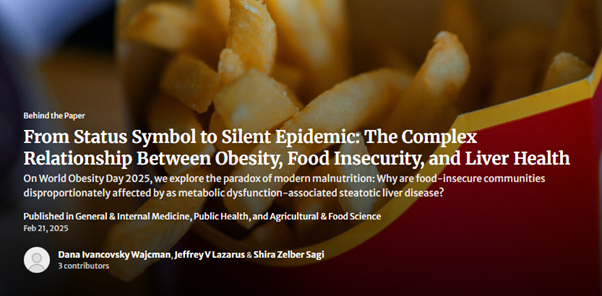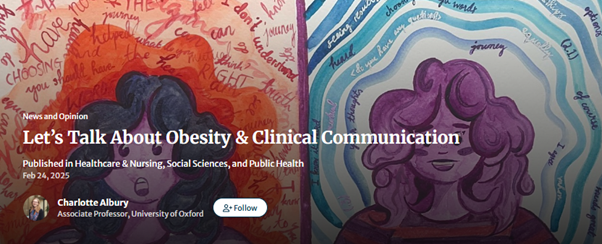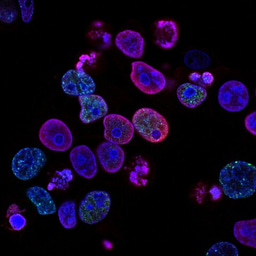Highlights from the Medicine and Life Sciences Research Communities
Published in Cancer, Cell & Molecular Biology, and Genetics & Genomics

While reviewing recent blog publications in the Health & Clinical Research and Life Science Communities, one topic kept re-emerging, World Obesity Day. Held every year on March 4th, World Obesity Day aims to raise awareness and advocate for solutions to the global obesity crisis and highlight the urgent need to improve how we understand, prevent, and treat obesity.
If you’d like to learn more, I highly recommend visiting the World Obesity Day website where you can explore personal stories, advocacy opportunities, and ways to raise awareness.
In this blog post, I wanted to highlight some of the research on this topic shared by our authors and the stories of how this research came to be. From how clinicians can better communicate with patients about obesity to how AI is driving Europe’s first Childhood Obesity Prevention Network, these studies highlight the incredible work being done to tackle this global challenge.

The Complex Relationship Between Obesity, Food Insecurity, and Liver Health
For centuries, a larger body size was a sign of wealth and health. Today, obesity is more often linked to food insecurity and chronic diseases like metabolic dysfunction–associated steatotic liver disease (MASLD). This paradox is particularly interesting to read , how is it that those struggling to afford food are also at the highest risk of diet-related illnesses?
This blog post by @Dana Ivancovsky Wajcman @Jeffrey V Lazarus and @Shira Zelber Sagi expands on the paper published in Nature Reviews Gastroenterology & Hepatology and discusses ways food insecurity fuels poor nutrition, from aggressive marketing of unhealthy foods to limited access to fresh, affordable produce. More importantly, it also explores solutions, policy changes, healthcare interventions, and community-driven efforts, to break this cycle.
Read the full 'Behind the Paper' post here, which expands on how food inequality is shaping global health and, importantly, what we can do about it.
Preventing childhood obesity with AI
Childhood obesity is particularly challenging due to its lifelong impact, shaped by diet, exercise, genetics, environment, and behaviour.
This ‘Behind the Paper’ post, written by @Izidor Mlakar following publication of their article in ISRCTN registry, expands on how Europe's first AI-powered childhood obesity prevention network got started by asking a key question: ‘why do some children respond well to obesity interventions while others see little effect?’
This question led researchers to develop the BIO-STREAMS project, a digital biobank that connects data from thousands of children across Europe, helping to predict which interventions work best for different individuals.
Explore how cutting-edge technology was developed to shape the future of childhood obesity prevention in this ‘Behind the Paper’ blog post.

Let’s Talk About Obesity & Clinical Communication
I really enjoyed reading this ‘News and Opinion’ blog by @Charlotte Albury on how small changes in conversation can make a huge difference in obesity care. This post discusses how the way healthcare professionals talk about weight, down to specific words and tone, can completely change how patients perceive the helpfulness of conversations, with some common approaches potentially doing more harm than good.
The research discussed breaks down how professionals and patients living with obesity can have supportive and helpful conversations together when discussing obesity and how simple tweaks in communication can lead to better support and real progress. Learn more about healthcare, patient communication and the power of words in this 'News and Opinion' blog post.
Explore more content and continue the conversation around World Obesity Day 2025
The editors and publishers at BMC have selected and shared a number of articles from the Research Communities, collections, and research highlights that support World Obesity Day 2025. The post follows BMC’s commitment to support the Sustainable Development Goal 3: Ensure healthy lives and promote well-being for all at all ages.
Join the Conversation!
There is always an abundance of amazing research stories being showcased on the Research Communities. To explore more, visit the ‘Behind the Paper channel and learn what thoughts and ideas go on behind the scenes of research projects.
Interested in more content highlighting awareness days on the Research Communities? Read more about World Water Day and World Tuberculosis Day, as well as other blog roundups:
- February Highlights from Mathematics, Physical, and Applied Sciences Communities
- March Highlights from Mathematics, Physical, and Applied Science, focusing on World Water Day
- Top Posts from the Research Communities in 2024
- February Highlights from Humanities and Social Sciences Communities
- SDG Action & Awareness Week: Exploring SDG Success
Don’t forget to like and start conversations in the comment section of the posts you enjoy. Is there more you would like to learn from the author? Let them know in the comments!
If you have any questions, get in touch with the team at communities@springernature.com
Follow the Topic
-
Nature Reviews Gastroenterology & Hepatology

The basic, translational and clinical content in this journal is written by internationally renowned basic and clinical academics and researchers and targeted towards readers in the biological and medical sciences, from postgraduate level upwards.
-
BMC Primary Care

Previously known as BMC Family Practice, this is an open access, peer-reviewed journal that considers articles on all aspects of primary health care research.
-
ISRCTN: The UK’s Clinical Study Registry

A primary clinical trial registry recognised by WHO and ICMJE that accepts studies involving human subjects or populations with outcome measures assessing effects on human health and well-being, including studies in healthcare, social care, education, workplace safety and economic development.
Your space to connect: The Primary immunodeficiency disorders Hub
A new Communities’ space to connect, collaborate, and explore research on Clinical Medicine, Immunology, and Diseases!
Continue reading announcementRelated Collections
With Collections, you can get published faster and increase your visibility.
Communication in primary care
BMC Primary Care is calling for submissions to our Collection Communication in primary care. Effective communication in primary care is crucial for fostering strong patient-doctor relationships and enhancing health outcomes. This Collection aims to explore the various dimensions of communication within primary care settings, including patient-doctor interactions, the role of health literacy, and the dynamics of shared decision-making. By investigating these elements, we can better understand how communication influences patient experiences, satisfaction, and adherence to treatment plans.
The significance of communication in primary care has gained heightened attention, particularly in light of recent advances in telehealth and digital health technologies. These innovations have transformed traditional communication methods, presenting both opportunities and challenges for healthcare providers. Additionally, effective communication strategies have been shown to improve patient engagement, reduce misunderstandings, and promote collaborative care. As healthcare systems increasingly prioritize patient-centered approaches, understanding and enhancing communication practices is essential for delivering high-quality primary care.
Continued research in this field may lead to the development of novel communication frameworks and training programs that equip healthcare providers with the skills necessary to navigate the complexities of patient interactions. This could result in more effective shared decision-making processes, ultimately improving health outcomes and patient satisfaction. Additionally, advancements in technology may facilitate more personalized communication strategies, bridging gaps in understanding and fostering stronger patient-provider relationships.
In this Collection, we welcome submissions that cover a wide array of topics, including but not limited to:
- Strategies for enhancing patient-doctor communication
- Health literacy and patient engagement
- Impact of technology on healthcare communication
- Shared decision-making in primary care
All manuscripts submitted to this journal, including those submitted to collections and special issues, are assessed in line with our editorial policies and the journal’s peer review process. Reviewers and editors are required to declare competing interests and can be excluded from the peer review process if a competing interest exists.
Publishing Model: Open Access
Deadline: Jul 30, 2026
Managing substance use disorders
Substance use disorders are a multifaceted issue that poses significant challenges to primary care providers and the healthcare system at large. This Collection aims to explore various dimensions of substance use management, including the identification and treatment of drug, alcohol, and tobacco use disorders. Research that focuses on screening, diagnosis, and risk assessment in primary care settings is particularly valuable in understanding how to effectively manage these disorders and reduce their impact on individuals and communities.
Understanding and addressing substance use disorders is crucial for enhancing public health outcomes and ensuring the well-being of patients. Recent advances in screening tools and interventions have shown promise in identifying individuals at risk and providing them with appropriate support and treatment. By fostering collaboration between primary care providers, mental health professionals, and community organizations, we may witness a significant shift in how substance use is perceived and managed, ultimately improving health outcomes and quality of life for affected individuals.
We invite submissions on a range of topics that include but are not limited to:
- Innovative screening methods for substance use disorders
- Interventions for alcohol use disorders
- Management strategies for tobacco cessation
- Risk assessment approaches in primary care
All manuscripts submitted to this journal, including those submitted to collections and special issues, are assessed in line with our editorial policies and the journal’s peer review process. Reviewers and editors are required to declare competing interests and can be excluded from the peer review process if a competing interest exists.
Publishing Model: Open Access
Deadline: Sep 08, 2026





Please sign in or register for FREE
If you are a registered user on Research Communities by Springer Nature, please sign in